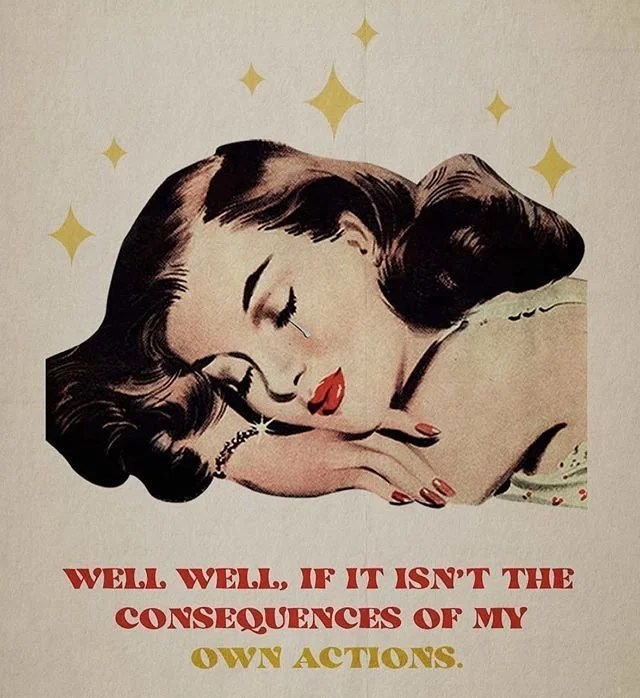Consequences Are Good, Actually?
image from @vintagefantasymag
Accountability can be a huge trigger for a shame spiral. Feeling blamed is not an easy place to be. But learning how to be accountable is one of the most important parts of recovery (or, more broadly, becoming a mature, self-actualized person in the world). Being able to hold yourself accountable gives way to a deep sense of self-awareness, which helps with not wading into the murky waters of projecting your subconscious bullshit onto everyone around you. Being able to hold space for accountability, while simultaneously keeping the shame monster at bay, is the key to everything.
Where do these shame spirals come from?
Imagine you had an unstable parent who was never able to embrace the discomfort of being responsible for their own actions. Every time something broke, or they fucked up, or something bad was happening in their life, or whatever everyday annoyance they were experiencing, they would find a way to either blame or take it out on you. Besides never demonstrating the grace of being able to be accountable, what do you think being blamed for stuff that is beyond their control does to the child in this scenario?
It makes blame so heavy.
It becomes a trigger.
Before we make ourselves a safe space for ourselves and our wounds and faults and patterns, we do everything we can to avoid feeling our feelings. It’s that pandora’s box thing—it’s that feeling of “If I feel even one feeling, the whole lid’s gonna blow off and I’m going to have to feel it all. I don’t know if I can handle that.”
This makes us seek out distractions or addictions that can numb us out, or relationships that distract us—we might throw ourselves into work or hide away from the world; anything to not have to feel our feelings.
The only problem is that whatever goes unexpressed or unconscious,
will rear its ugly head.
People who don’t know how to be accountable hurt other people. Plain and simple. Part of taking responsibility is learning to consider all the consequences before following through with an action. Yelling at your child? Gossiping about a friend? Pushing someone you love away? Cheating on your partner? Hitting below the belt in an argument and saying the worst thing you can think of? When you’re self-aware, you can greet these impulses head-on and think them all the way through, eventually rising above them and moving in a healthier direction.
When you aren’t, well, life can get messy.
Refusing to take responsibility can cause a lot of harm. We see this happening now with so many adults who are products of toxic family dynamics choosing to put distance between themselves and their family that refuses to heal or change or even respect a boundary. Usually, this comes after many hard conversations and attempts by the person who’s doing the healing to try and bring some of the darkness from the past to light. What they usually end up getting is gaslit.
This gaslighting isn’t usually coming from any more malicious a place than the person being confronted not being able to sit with their own discomfort in knowing the ways their actions affected someone else. But regardless of how unintentionally hurtful it was, it creates a barrier to the kind of emotional intimacy and trust that creates a deep bond. And for many people, a superficial bond rooted in eggshell walking isn’t enough. Plus, if someone isn’t willing to face their own consequences, they are more likely to cause harm in the same way again.
Without changed behavior, an apology means nothing.
Discomfort is something we logically try to avoid. It’s probably something evolutionary where the feeling of discomfort meant danger was near and that’s why we’re so hardwired to avoid it. But it isn’t a source of danger. It’s a tool for growth. It’s a relationship builder. It nurtures intentional communities. It’s an act of love.
How many people start their recovery stories with tales of Rock Bottom? That’s because Rock Bottom is a consequence. That doesn’t mean it doesn’t hurt to think about it!! That doesn’t mean there isn’t all kinds of cringing at the physical sensation of shame!! But those feelings pass. If you can sit with them and ride them all the way out, they pass.
Then all that’s left is a new way of seeing, understanding, and being. Then you can move through life more and more gently with every wound properly tended to with compassion, forgiveness, and love.
The shame won’t eat you alive—it’s totally healable.
But the avoidance and unwillingness to change will.
Embrace accountability. Understand why you did what you did when you did it—not as an excuse, as an explanation. Explore your patterns, and allow the knowledge of any harm you’ve caused to wash over you. But if you hear that venomous voice of shame creep into your process, try to redirect your thoughts to compassionate ones. Think about what you would say to someone who’s coming to you genuinely trying to make amends, and give yourself that same grace.
This exploration won’t only be painful, it will also be beautiful. It will deepen your understanding and relationship with yourself. It will make you less guarded, less critical, and less judgmental. It will reinforce your integrity. It will give you stability. It will set you free.
Listen Here
#mentalhealthblog #mentalhealthblogger #consequences #takingresponsibility #accountability #makingamends #recovery #howtofeelbetter #howtolovemyself #selfhealers #boundaries #integrity #speakingyourtruth #nocontact #toxicfamilies #selflove #selfhelp #selfcare #selfcompassion #personalgrowth #healing #selfhelpblog #selfhelppodcast #forgiveness #innerpeace #confidence #howtobeconfident #communitybuilding #mentalhealthpodcast #spiritualblog #spiritualpodcast #selfloveblog #selflovepodcast


